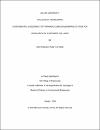Experimental Assessment of Forward Osmosis Membrane System for Separation of Suspended Colloids
Abstract
The formation of the stable suspended colloids is well known in many industrial
applications, whether you are in the wastewater treatment, dairy, chemical refinery, or food
processing and production industry. Always there is one common challenge everyone
faces: Total Suspended Solids (TSS). These suspended colloids can be very stable and
difficult to separate due to their small size (less than 2?m). Many methods were tested for
treating removing such colloidal particles. However, each method has its limitation in
capability, depending on the condition and concentration of such colloidal particles. In this
study, Forward Osmosis (FO) is used to remove such stable suspended particles without
any flocculation and coagulation pretreatment. Forward Osmosis (FO) is an emerging
technology in water treatment, which has several applications in different industries, and it
has many advantages over other membrane processes. FO treats complex effluents with
high rejection rate, has lower fouling/cake formation affinity, and relies on the difference
in osmotic pressure across the membrane without the need of high-pressure aids which
means minimum energy requirement. The utilization of FO in separating suspended
colloids and its performance under different operating conditions. The results showed that FO membrane significantly remove the suspended colloids without having permanent
fouling. This study concluded that FO membrane is promising technology for removing
stable colloidal particles from wastewater effluent.
DOI/handle
http://hdl.handle.net/10576/12664Collections
- Environmental Engineering [59 items ]


